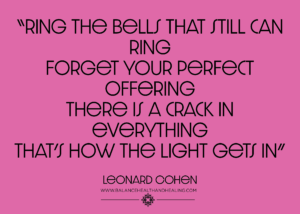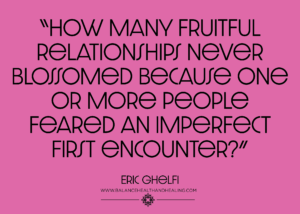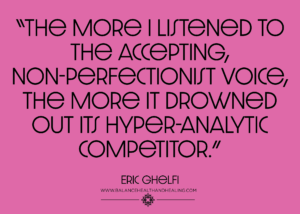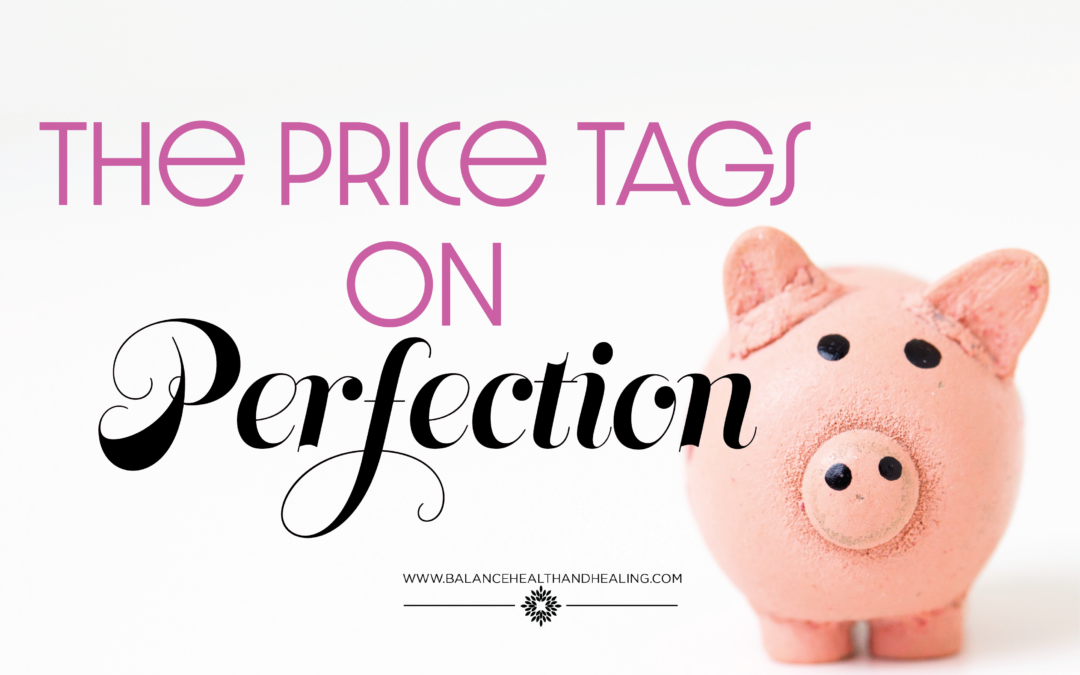During my sophomore year of college, at the age of 20-years-old, I began an online exchange with my grandfather that lasted over six years. He, being well aware of my tendency to over-analyze, once asked what I thought was the worst enemy of “good enough.” I said I didn’t know. He said, “Perfection.”
Through childhood and adolescence, I labored over even simple decisions. The colors had to fit perfectly inside the lines. Every comma had to adhere to a strict grammatical structure. Every article of clothing had to fit just right, or I would obsess over how wrong it felt on my skin.
article of clothing had to fit just right, or I would obsess over how wrong it felt on my skin.
This tendency, widespread as it is, brings a host of problems. Perfection demands devotion. It resists and rejects everything beyond its purview. And perfectionism’s grip is strong. Its claims constrict us and color reality. Under its spell, we hardly doubt its reachability, if only we try hard enough. The person chasing perfection, I would argue, is a person conning herself. But what is she conning herself out of? What does it cost to enter the race for the flawless?
Time Costs
Firstly, it takes a lot of time to make the perfect choice—turn in your best work, select the right restaurant, the ideal first-date activity. How much time and mental strain do we waste? Comedian Aziz Ansari wrote a bit where he explored his process of choosing a toothbrush:
Before I left my house, I searched “best toothbrush.” It seemed like the sensible thing to do. As I typed in the search box, the auto-fill completed the thought immediately. I wasn’t alone in my toothbrush purchase insecurity. . . .Why waste my time trying to find the best? Have you ever run into someone with no teeth and asked, “What happened?” And they replied, “Bought the wrong toothbrush. Should have done more research.”
Time is scarce, and no amount of prudence or planning can guarantee anyone more of it. Often, the task of optimizing our lives absorbs more time and attention than we would give it in our sanest moments.
Opportunity Costs
 Secondly, perfectionism can lead you to avoid tasks and activities where you might fail, look silly, or otherwise demonstrate—if only to yourself—your fallibility. One of my favorite musicians, Mike Kinsella, said in an interview that he could hardly stand listening to his own music. He hears the flaws and cringes. How remarkable, I thought, that he publishes the music anyway. I wondered how many artists, warped by self-doubt and unrealistic standards, hid their work from the world. How many great singers never perform outside the shower? How many writers conceal their stories in secret folders or blogs set to private?
Secondly, perfectionism can lead you to avoid tasks and activities where you might fail, look silly, or otherwise demonstrate—if only to yourself—your fallibility. One of my favorite musicians, Mike Kinsella, said in an interview that he could hardly stand listening to his own music. He hears the flaws and cringes. How remarkable, I thought, that he publishes the music anyway. I wondered how many artists, warped by self-doubt and unrealistic standards, hid their work from the world. How many great singers never perform outside the shower? How many writers conceal their stories in secret folders or blogs set to private?
In my experience working with psychotherapy clients, the most damaging opportunity cost of perfectionism is the toll it takes on relationships. How many fruitful relationships never blossomed because one or more people feared an imperfect first encounter? How many important conversations never happened because someone wouldn’t broach the subject?
Emotional Costs
The emotional costs of perfectionism seem obvious from the outside. It hurts to fall short. Failure stings, and a bar set to inhuman heights makes this sting a permanent companion. Conceptually, most people understand this with little trouble. But I believe it’s more powerful to explore the way this looks in real life.
It is losing sleep while replaying botched conversations. It is feeling shame over a morning donut. It is telling yourself you’re too dumb, too short, too pale, or too boring to be worth anyone’s time. It is believing, from moment to moment, the voice that demands a change here—a change there—before you can rest satisfied and accept yourself. It is the bitter ground between certain loneliness and a just-unachievable ideal.
So What Next?
As Uncle Iroh said to Aang in Avatar: The Last Airbender, “Perfection and power are overrated. I think you are wise to choose happiness and love.” You might agree with Iroh in opposing perfectionism, but it’s another challenge altogether to weaken its influence in your life, to choose happiness and love. So where can you start?
They key, of course, is practice. At least it is for me and many of the clients I work with. All those years ago, my grandfather suggested I practice making small decisions quickly: “Most decisions  won’t make one iota of difference in your life, no matter which way you go.” Instead of deliberating over which loaf of bread or brand of shampoo would be best, I trained myself to sweat the small stuff less. Even if I made a mistake grocery shopping, the consequences would be minor, and I would have saved precious time and mental space. What’s more, the process reinforces itself. The more I listened to the accepting, non-perfectionist voice, the more it drowned out its hyper-analytic competitor.
won’t make one iota of difference in your life, no matter which way you go.” Instead of deliberating over which loaf of bread or brand of shampoo would be best, I trained myself to sweat the small stuff less. Even if I made a mistake grocery shopping, the consequences would be minor, and I would have saved precious time and mental space. What’s more, the process reinforces itself. The more I listened to the accepting, non-perfectionist voice, the more it drowned out its hyper-analytic competitor.
You can also learn to challenge your inner perfectionist. Counterintuitive as it is, you are distinct from most of your thoughts. In other words, you don’t have to buy everything that pops into your head. You can replace thoughts like, “This paper has to be perfect,” with, “If it’s worth doing, it’s worth doing poorly.” You can lean into the latter, leaving more room to nurture the happiness and love you long for. You can begin, step by step, to cultivate an accepting attitude toward yourself that, as Carl Rogers famously said, is the most likely attitude from which behavioral and personal change spring.
Finally, you might pause to consider what benefits your perceived flaws have contributed to your life. When Miles Davis was recording Kind of Blue, a classic jazz album, his drummer played a pattern on the snare drum that sounded like “surface noise” to the audio engineer. It sounded, in other words, like a messy presence. When the engineer suggested they cut the sound, Miles Davis said, “No. That’s part of it.” He knew what made his jazz work. It was its humanity, its subtle imprecision, that gave it life. “There is a crack in everything,” to harken back to this post’s epigraph. “That’s how the light gets in.”

